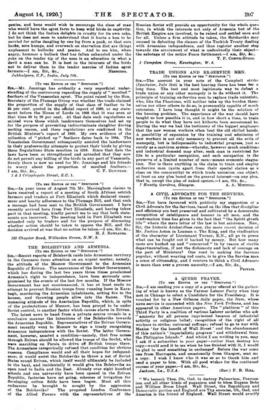TRADE UNIONS AND EX-SERVICE MEN
[To THE EDITOR OP THE " SPECTATOR."] SIR,—The account in your note of the Campbell strike (Spectator, July 21st) is the beet hearing there has been for a long time. The best and most legitimate way to defeat a trade union or any other monopoly is to do without it. The principle of training ex-Service men to replace trade unionists, who, like the Pharisees, will neither take up the burden them- selves nor allow others to do so, is presumably capable of much extension. I have long thought it might be the solution of the housing problem. The experience of the war should have taught ns how possible it is, and in how short a time, to train people to do what they have not hitherto been accustomed to. During the war we had the testimony of the biggest employers that the new women workers often heat the old skilled hands. A possibility of expansion by the training and admission of new workers is not only necessary to prevent all the evils of monopoly, but is indispensable to industrial progress, just as surely as a cast-iron system—whereby, however much conditions and industrial demand may alter, each man is restricted for life to a particular occupation, and each occupation is the preserve of a limited number of men—means economic stagna- tion. Nor is there anything in the claim to train and employ ex-Service men (quite apart from their special claims as a class on the community) to which trade unionism can object. at least on any plea based on the general interest—on any plea. that is, except the plea of naked egoism.—I am, Sir, &c.,


































 Previous page
Previous page